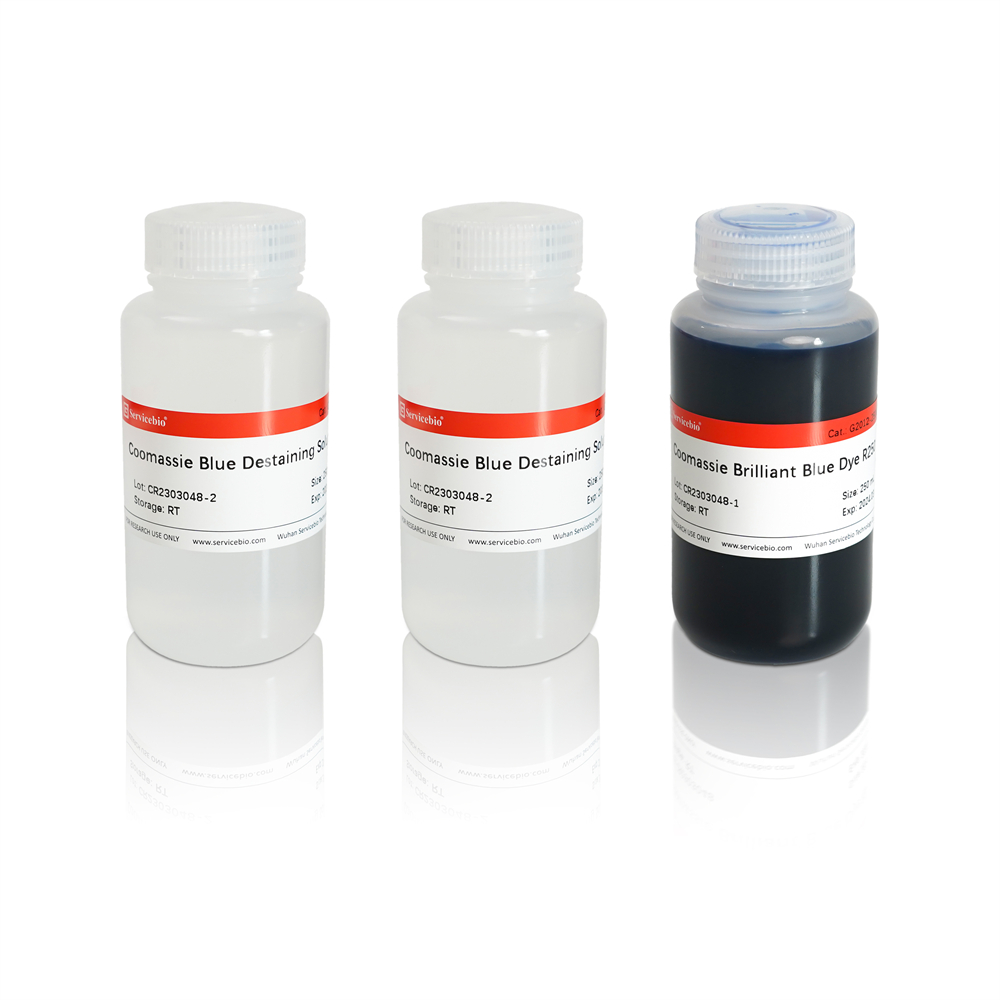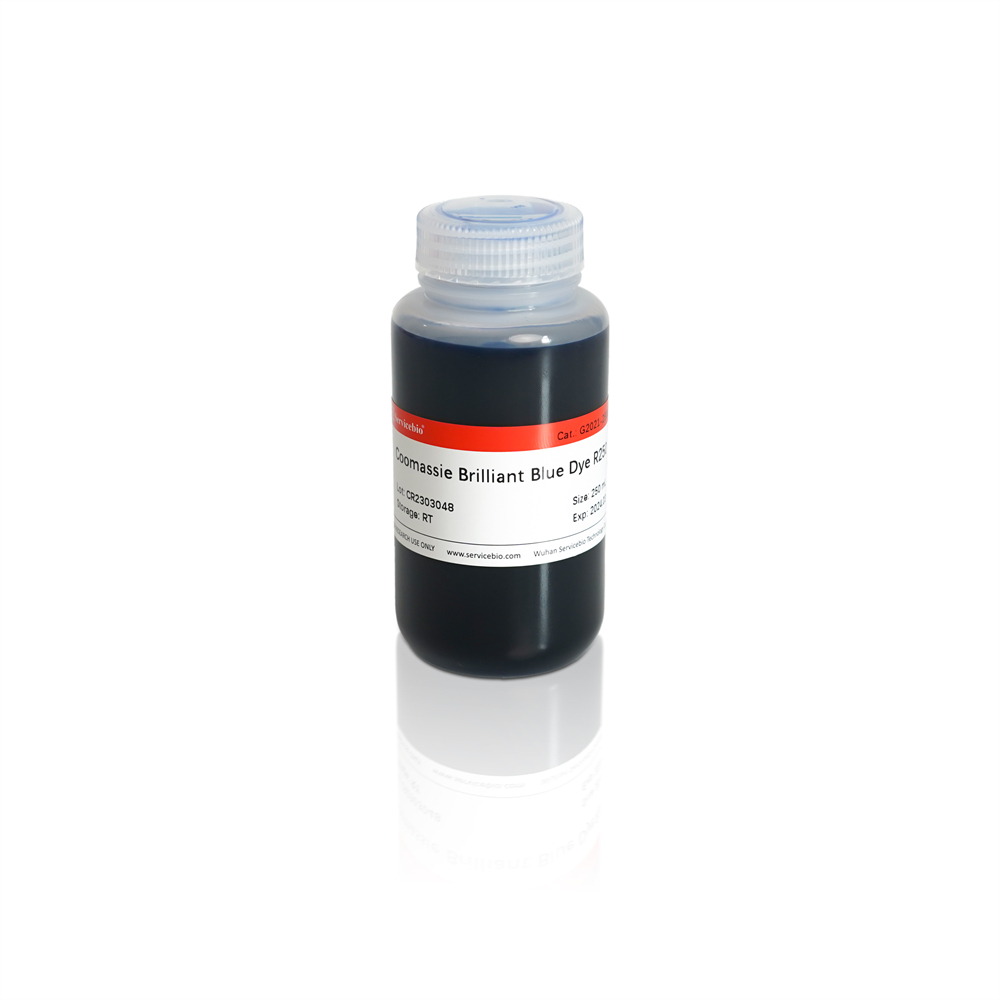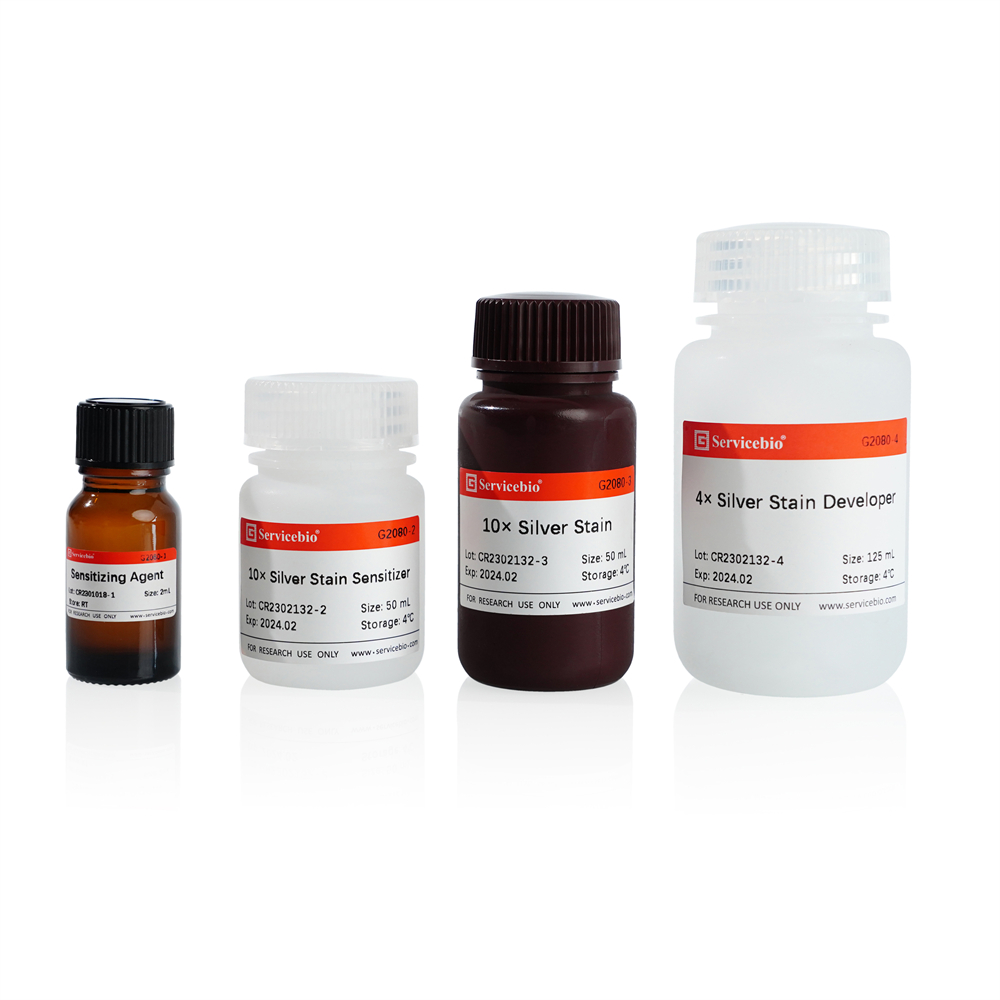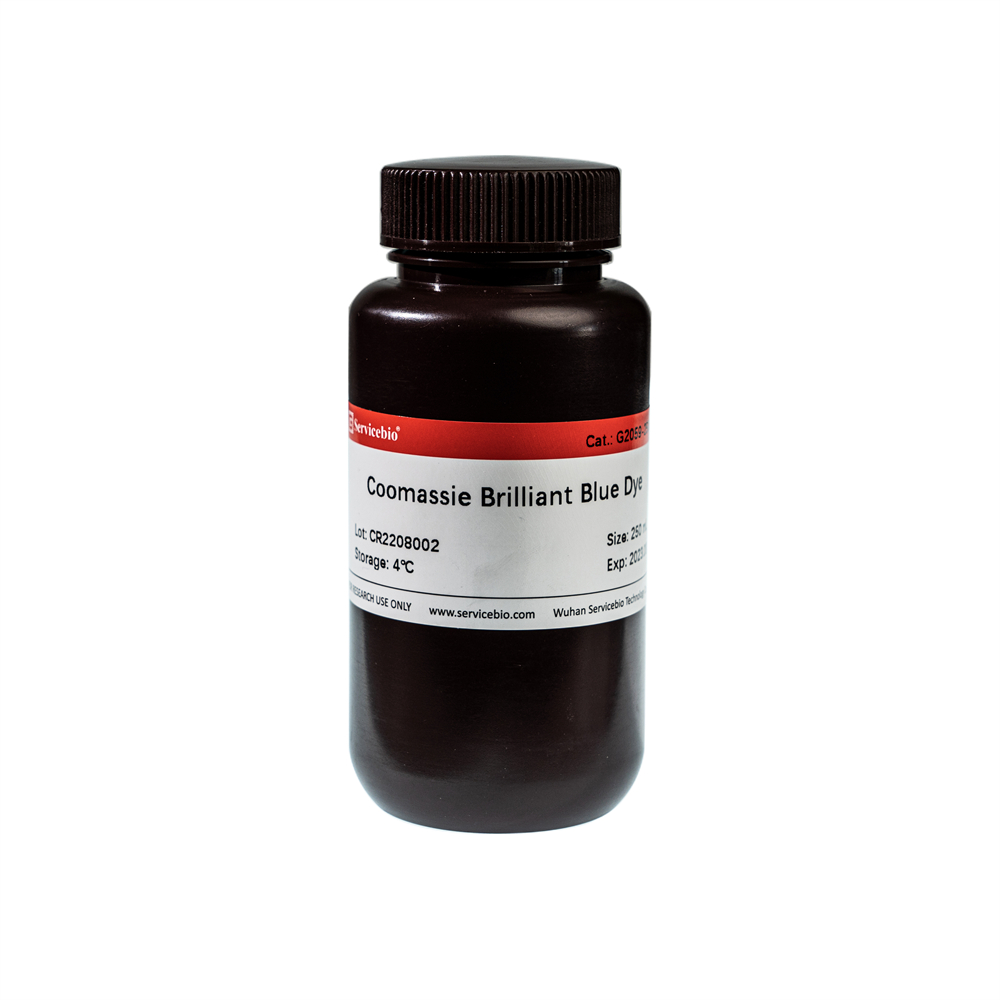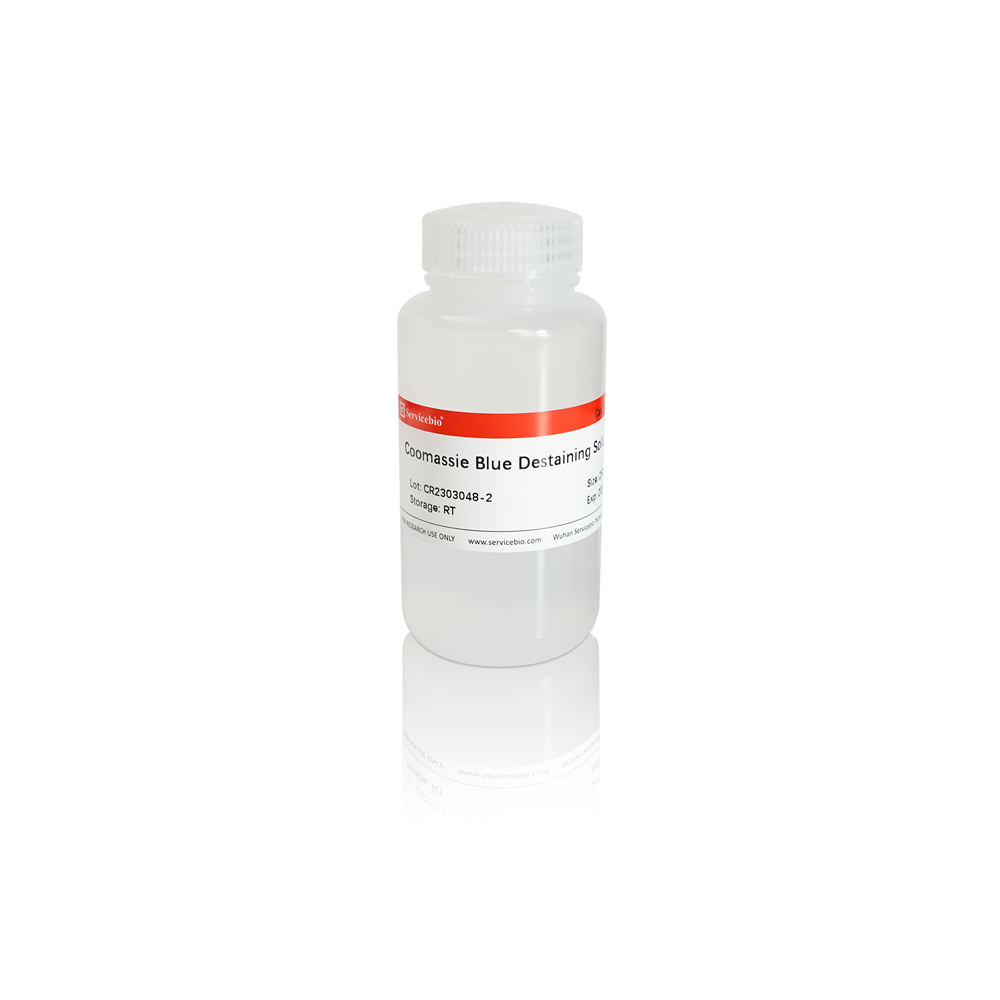Description
Product Information
| Product Name | Cat.No. | Spec. |
| Coomassie Bright Blue Dye Kit | G2012-250ML | 250 mL |
Description
This product uses Coomassie brilliant blue R250 as the dye and does not contain toxic methanol. It is mainly used for routine staining and decolorization of protein electrophoresis polyacrylamide gel. The main component of the staining solution was Coomassie brilliant blue R250; The main components of decolorization solution are absolute ethanol and glacial acetic acid.
Storage and Handling Conditions
Store and transport at room temperature, valid for 12 months.
Component
| Component Number | Component | G2012-250ML |
| G2012-1 | Coomassie Bright Blue R250 | 250 mL |
| G2012-2 | Coomassie Bright Blue Decoloring Solution | 2×250 mL |
| Product Manual | ||
Assay Protocol
Conventional dyeing and decolorization methods::
1. After electrophoresis, the polyacrylamide gel was taken out and put into an appropriate amount of Coomassie brilliant blue dye solution R250, which was suitable to just cover the gel.
2. Dye 4-12 h at room temperature on a horizontal shaker, or increase the temperature appropriately to reduce the dyeing time.
3. Pour out the dye solution, add appropriate amount of Coomassie brilliant blue decolorization solution to cover the gel, and decolorize for 4-12 h at room temperature until the gel background is clean and clear dark blue protein band can be seen. The decolorization solution should be replaced during the process.
Rapid dyeing and decolorization method:
1. After electrophoresis, take out the polyacrylamide gel and moisten it twice in distilled water, then add appropriate amount of Coomassie brilliant blue dye solution R250 to cover the gel. Heat in the microwave until nearly boiling, then stop heating immediately. If the solution is boiled, the gel will be damaged and broken.
2. Then, under the condition of high temperature of the staining solution, stain on the horizontal shaker for about 5 min until clear protein bands can be seen.
3. Pour out the dye solution, add an appropriate amount of Coomassie brilliant blue decolorization solution to cover the gel, and heat it in the microwave oven on low heat until it is close to boiling, then stop heating immediately. Similarly, the boiling solution is easy to lead to gel breakage and fragmentation.
4. Keep the decolorization solution at a high temperature for 20-30 min, during which the decolorization solution can be changed 2-3 times, and the decolorization can be heated and shaken in the microwave oven until the blue background is basically removed and the protein band reaches the expected staining result.
5. After decolorization, the gel can be stored in water or 20% glycerin solution and photographed as soon as possible. If long-term storage is required, dry glue can be prepared.
Note:
1. Coomassie Brilliant blue dye R250 can be recycled and used repeatedly.
2. For the glue concentration less than 10%, the operation should be careful to avoid the situation of glue fragmentation.
3. If using rapid dyeing and decolorization method, be sure to use microwave oven for low heat because the staining solution and decolorization solution contain ethanol.
4. Wear a lab coat and disposable gloves during operation.
For Research Use Only!
|
Cat.No.
|
Product Name
|
Spec.
|
Operation
|
|---|
|
G2002-100ML
|
RIPA Lysis Buffer (Strong)
|
100 mL
|
|
|
G2002-30ML
|
RIPA Lysis Buffer (Strong)
|
30 mL
|
|
|
G2003-50T
|
SDS-PAGE Gel Preparation Kit
|
50 T
|
|
|
G2004-100ML
|
30% Acrylamide-Bisacrylamide (29:1)
|
100 mL
|
|
|
G2006-250UL
|
50×Cocktail Protease Inhibitor
|
250 μL
|
|
|
G2007-1ML
|
Phosphoprotease Inhibitor
|
1 mL×2
|
|
|
G2008-1ML
|
PMSF (100mM)
|
1 mL
|
|
|
G2018-1L
|
Tris-Glycine SDS-PAGE Running Buffer (Powder)
|
1 L
|
|
|
G2033-100ML
|
RIPA Lysis Buffer (Weak)
|
100 mL
|
|
|
G2033-30ML
|
RIPA Lysis Buffer (Weak)
|
30 mL
|
|
|
G2053-100ML
|
1.5 M Tris-HCl (pH 8.8)
|
100 mL
|
|
|
G2054-100ML
|
1 M Tris-HCl (pH 6.8)
|
100 mL
|
|
|
G2055-5ML
|
10% SDS Solution
|
5 mL
|
|
|
G6019-9
|
Antibody Incubation Box (9 Grids)
|
9 grids
|
|
|
G6020-9
|
Antibody Incubation Box (9 Grids Light-Proof)
|
9 Grids Light-Proof
|
|
|
G6025-2
|
Antibody Incubation Box (2 Grids)
|
2 grids
|
|
|
G6026-4
|
Antibody Incubation Box (4 Grids)
|
4 grids
|

